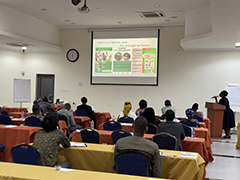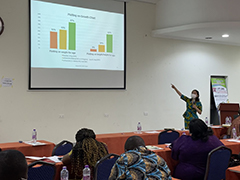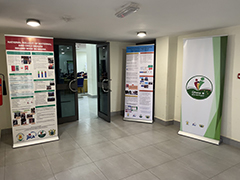- Home
- Technical Cooperation Projects
- Index of Countries
- Africa
- Ghana
- Project for Improving Continuum of Care for Mothers and Children through the introduction of Combined MCH Record Book
- Project News
- National Review Meeting on MCH RB Program was conducted with all 16 regional teams
Project News
2021-10-12
National Review Meeting on MCH RB Program was conducted with all 16 regional teams
The National Review Meeting on MCH RB Program was held on 30th September and 1st October in Ashanti region. The purpose of the meeting was to share the progress and achievement of the National Program of the MCH RB launched in 2018, to refresh health managers' skills and understanding with regards to the use of data from the book, to share key lessons learned from implementation, best practices, challenges, and key recommendations and to discuss program sustainability issues for the integration into existing RMNCAH&N programs[1]. Total 70 people participated in the meeting: from GHS HQ, all 16 regional health directorates, JICA Ghana office, WHO, and USAID.
Note
- [1] Ghana is implementing Ghana Integrated Reproductive, Maternal, Child and Adolescent Health and Nutrition Strategic Plan for 2020-2025 which was released in December 2020.
Presentation of all 16 regions on their MCH RB program (Day 1)
Regional Health Team from all 16 regions shared their achievement, challenges and good practices, and actively exchanged ideas for sustainable approaches to the use of the MCH RB for quality RMNCHA&N services.
The Regional Health Team from Greater Accra region presented their innovative approach to the health worker training conducted with their capacity and various resources. The facilitators in Greater Accra region trained more than 1000 health workers with their limited resources by combining 29 administrative districts into 16 clusters. The trained health workers conducted an orientation to more than 1000 health workers at each district and facility. They have also conducted on-site coaching, which contributed to more staff motivation and participation in the program and better quality of services. They intended to scale up the periodical refresher training and monitoring and supervision to ensure sustainability.
In Volta Region, the Regional Health Team conducted monitoring and supervision (M&S) periodically after the training. They prioritized the M&S at the hospitals as they found that the health workers at the hospitals did not use MCH RB effectively where more mothers and children receive MCH and Nutrition services. They have covered 15 hospitals out of the 17 hospitals in the region. In addition to the M&S, they followed up with the health workers through phone calls and SNS. These communications made it possible for health workers to solve problems on time, and health workers recorded the MCH RB better and conducted counseling with better counseling skills. The regional team was sure that the continuous M&S was very effective in strengthening health workers' skills and services, and thus they wanted to expand M&S to other districts.
The Regional Health Team in Eastern region organized an advocacy meeting with the Regional Minister and the Regional Coordinating Council (RCC) to address the importance of MCH RB and the need for support for printing. As a result, the regional team received support from the Metropolitan, Municipal, and District Chief Executive (MMDCEs) to print 500 MCH RB. This effort to involve local government drew strong interest from other regional officials.
Based upon the presentation by 16 regions, the participants discussed the common implementation challenges, such as the shortage of the MCH RB and how to strengthen and sustain health workers' capacity. MCH RBs are presently procured at the national level and distributed to regions, districts, and health facilities. Delays or maldistribution in procurement, storage, and distribution stages can lead to a shortage of MCH RB at the facility. Thus, the planning process, procurement, and distribution need to be accountable to all stakeholders. Concerning the technical aspect of the utilization of the MCH RB, systematic orientation is necessary for newly assigned health workers. Currently, some regional teams face difficulties sustaining technical skills among health workers due to the frequent attrition of health workers. Discussion on these issues became heated and continued to the second day.
Achievement of the MCH RB Program and discussion on sustainability (Day2)
Ms. Esi Amoaful and Dr. Akiko Hagiwara presented on the overall progress and achievement of the MCH RB program. The project conducted training and M&S across the country, trained more than 2500 health workers and also GHS expanded the training and M&S with other partners' funds. As a result, we saw significant improvement in utilization of Continuum of Care among mothers and children, recording of MCH RB, and counseling skills. For example, the recording of the date of birth and the weight at birth was 45% in 2019, improved in 2021 to 82% nationally and 93% in the focus districts. 69% of mothers nationally and 92% in the focus district could recall what health workers advised during the counseling. These indicate that the counseling was conducted effectively and contributed to a better understanding of mothers. The fact that the results in the focus districts were better than national ones suggested that the health worker training and continuous M&S contributed to improving the knowledge and skills of health workers and the quality of care.
Dr. Kofi Issah, Director of Family Health Division, GHS, announced that only pregnant women should receive MCH RB starting from January 2022. While the GHS decided in 2018 that all pregnant women and children up to one-year-old should receive the MCH RB, some regions and districts have distributed them to children under 5-year-old because of strong demand from clients. It caused a shortage of the MCH RB last few years. At the same time, Dr. Issah also requested all 16 regions to survey the number of children under 5-year-old who did not have the book to fill the gap. He stressed that accountability was crucial to raising internal and external resources.
Dr. Issah and other members of the GHS also stressed the importance of regular monitoring and supervision to ensure the effective utilization of the MCH RB and the quality of services. He commented that GHS HQ and all 16 regions should establish a sustainable M&S and coaching system utilizing internal resources.
 Presentation of Ashanti region by Ms. Olivia Timpo, Regional Nutrition Officer
Presentation of Ashanti region by Ms. Olivia Timpo, Regional Nutrition Officer
 Presentation on the achievement of the project by Dr. Akiko Hagiwara, Chief Advisor
Presentation on the achievement of the project by Dr. Akiko Hagiwara, Chief Advisor
 Project banners displayed at the venue
Project banners displayed at the venue
Way forwards
This review meeting provided an excellent opportunity to visualize the achievements and challenges in all 16 regions since the National Program on MCH RB launched in 2018. The project will continue working with GHS to ensure the sustainability of the MCH RB program based upon the valuable discussion and comments raised at the review meeting.
- About JICA
- News & Features
- Countries & Regions
- Our Work
- Thematic Issues
- Types of Assistance
- Partnerships with Other Development Partners
- Climate Change / Environmental and Social Considerations
- Evaluations
- Compliance and Anti-corruption
- Science and Technology Cooperation on Global Issues
- Research
- JICA Development Studies Program / JICA Chair
- Support for the Acceptance of Foreign HRs / Multicultural and Inclusive Community
- Publications
- Investor Relations
